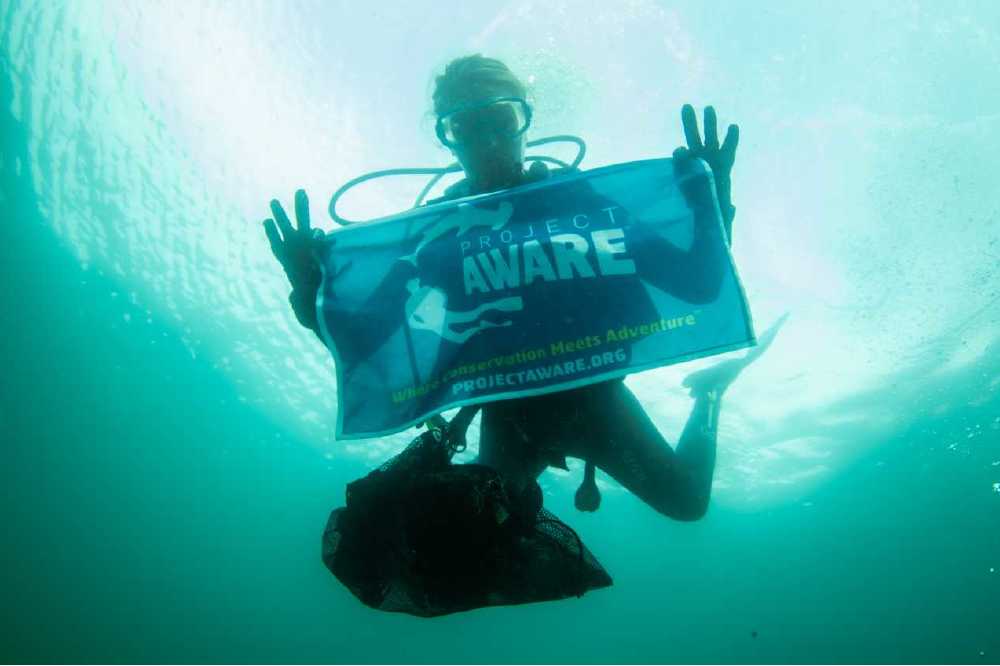Marine debris: Out of sight, out of mind? Not for scuba divers – By Domino Albert, Project AWARE Associate Director Global Communications

Divers Against Debris
What do shoes, shopping trolleys, a statue of Ganesh, a children’s doll, a Santa hat and skateboards all have in common? They are amongst the oddest items found by Dive Against Debris® volunteers since the global marine conservation charity, Project AWARE, launched its flag ship citizen science program in 2011.
The charity has also locked tentacles with Kraken Rum with £1 from the sale of its new limited edition ‘Unknown Deep’ bottle donated to the charity to allow rum connoisseurs and fans of the Kraken Black Spiced Rum brand to not only immerse themselves into the mythical sea story of the Kraken treasure but to connect with the challenges and threats that the ocean and its inhabitants are facing. As part of the launch, the rum brand also launched a ‘Dive Thru’, where champion freediver Beci Ryan suited up, swam down not to find trash but to rescue bottles from below the water – all in one breath!
The Weird and the Wacky Seven
1) A statue of the Hindu God, Ganesh
The 50 cm statue was found by a team of divers from the Maritime Aquarium, in Norwalk USA as part of Project AWARE's September Debris Month of Action celebrations
2) Shopping trolleys
Shop ‘til you drop they say! Trolleys are often found in lakes and rivers, or near jetties. Since Dive Against Debris launched, more than 50 shopping trolleys have been reported to the global dataset of marine debris, but we know a lot more are unreported and left submerged.
3) Skateboard
A skateboard was found in the River Thames when 50 volunteers from Aquanaut Scuba joined forces with Kingston University to undertake a huge clean-up project in the area. Spectators looked on in disbelief at the quantity of debris, including countless bikes, tyres, traffic cones and road signs
4) A Santa Hat
Christmas came early in Dumaguete city, the capital of Negros Oriental, a university town in the Philippines. In October 2016, a Santa hat was the last thing expected to be found by scuba divers at Liquid Dive Dumaguete during their monthly Dive Against Debris survey.
5) A Children’s Doll Head
It's kind of creepy when you come face-to-face with a doll's head ten-metres below the waves, but this is exactly what happened to the Divers Against Debris team in Malta.
6) Shoes and Flip-Flops
The Big Blue Mafia Island Diving Centre in Tanzania is often organising clean-up actions in co-operation with Bweni Secondary School, Frontier Tanzania and Mafia Island Marine Park. In 2017 they saw a surge in the amount of flip flops found on the beach. Unbelievably, the team once collected around 5,000 flip-flops from a 2km stretch of beach in just four weeks.
7) A ‘Makeshift’ Toilet
Found in the murky depths of the Sheffield Canal in the UK during one of our regular Dive Against Debris surveys, a team of 40 divers, led by Diveworld Sheffield, uncovered a seemingly never-ending stream of debris that had been cluttering up the waterway with the item, including our most bizarre and unusual discovery to date: a “makeshift toilet”
The Usual Suspects
There’s a vast array of debris items that divers are reporting through Dive Against Debris from the weird and whacky items to the usual suspects – fishing lines, plastic bags, drinks bottles and aluminium cans.

Since the program’s launch, more than 86,000 divers have participated in Dive Against Debris surveys in more than 120 countries around the world, removing and reporting over 1.6 million pieces of trash.
With 250 million metric tons of mismanaged plastic conservatively estimated to make its way into the ocean by 2025, it sadly comes as no surprise that plastic items are consistently the top items – accounting for almost 70 percent of all debris items reported to date.
Marine debris is a complex and vast issue to tackle. Strategic collaboration among stakeholders across the globe is absolutely imperative to addressing the issue and developing solutions to prevent debris entering the ocean in the first place. Partnerships – large and small – along with a groundswell of community support are two critical ingredients necessary to drive change.
As the only underwater debris data collection program of its kind, Dive Against Debris both improves the health of ocean ecosystems through localized volunteer efforts and provides valuable information about underwater debris – shining a light on an issue that has previously been disregarded as out of sight, out of mind for most of the public. Advancing our knowledge and understanding regarding marine debris, in particular seafloor debris, is integral in informing policy and developing solutions to prevent debris at the source.
There are many ways people can prevent and reduce marine debris – from government action to individual lifestyle changes. The ultimate solution is prevention, and we need to keep that as our highest priority. We can reduce, reuse, and recycle to keep debris out of the ocean in the first place. Visit www.projectaware.org for tips to reduce your plastic waste.

